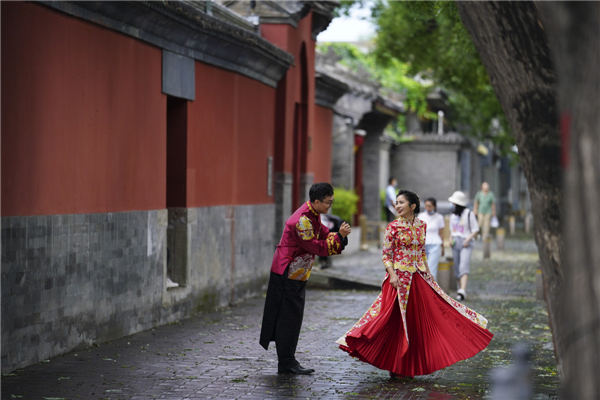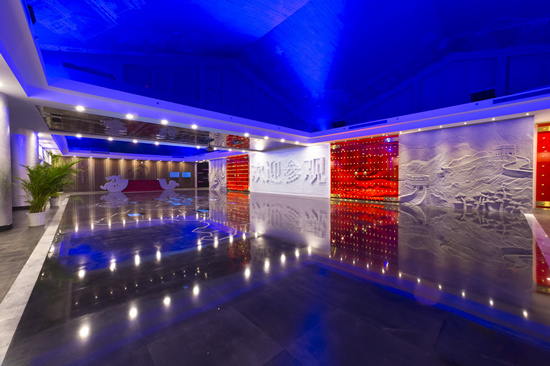Beijing takes road to future

Newlyweds pose for a photograph in downtown Beijing, where the capital's cultural heritage is being protected. [Photo/FENG YONGBIN for CHINA DAILY]
Cultural protection
Demolition of buildings will be prohibited in the core area, and the authorities will work to protect the city's cultural heritage, including ancient archaeological and revolutionary sites, streets, parks, alleyways and waterways.
Mao Dachuan, a Xicheng resident, said, "People pass a historic building everyday en route to school or work without knowing what it commemorates."
Some residents have even rented homes in the same courtyard for years without knowing that an ancient mansion owned by a minister used to stand on the site, he added.
This proves two things, Mao concluded. First, that the buildings are not adequately protected, and second, that they have not been put to the best use to educate or serve the public.
As part of the plan, the central authorities have strengthened protection of the city's cultural and historical heritage in the core area.
The plan stresses the need to maintain the overall structure of the old city area and encourage the opening and use of historic buildings. Major cultural areas near Beijing's ring roads should also be connected to better highlight them.
Li, the expert, said: "Protection and development should be sustainable. The key is to open more ancient sites and buildings to the public and involve more local residents in protection work."
In Dongcheng, the local government used to organize residents to clean up old courtyards as a form of community activity. During this work, cultural relics covered in dust were discovered in the corner of one yard.
"Including the public in protection activities and also improving their living conditions will bring new vitality to old areas of the city," Li said. "Creating memories for generation after generation who live in the area is best way to meet their expectations."
Zhang Jie, a professor at the School of Architecture at Tsinghua University, said the plan for the core area includes advanced, scientific and innovative concepts to protect old parts of the city.
Community improvement
The plan places considerable emphasis on the construction and management of housing blocks and communities, with the aim of creating better public space and living conditions.
Guan Chenghua, head of the Capital Institute of Science and Technology Development Strategy, said people's happiness is the ultimate goal of a country's social and economic development.
"The plan mentions communities many times. All its concepts, policies and regulations will eventually be realized in communities," he said.
Hong Xing, who lives in Xicheng, said it was once difficult for residents to buy vegetables at a time when the authorities were clearing vendors' stands from the streets and demolishing illegal constructions.
However, the problem was solved by the arrival in the area of convenience stores selling low-priced fresh vegetables and other daily necessities.
"Life is now convenient and easy. After seeing the plan for the core area, I have great confidence that it will become even better in the coming years," he said.
According to the plan, the proportion of public space in the core area will rise from the current 34.3 percent to 38.4 percent by 2035. Public green areas will rise by more than 25 percent.
Residents will have access to medical services and sports facilities within a 15-minute walk of their homes, while care for the elderly will be available within a 10-minute walk from residences.
Guan said: "There are many large parks in the capital, but people can only enjoy them during weekends. The new plan makes clear that the city will make full use of small areas in crowded streets and at housing blocks by creating 'pocket-size parks'."
The aim is to create an environment in which residents can enjoy nearby green areas every day.
In addition, Beijing will become "smarter", Guan said.
"The concept of the smart city has been espoused in many places, but just on a very general level. However, Beijing is different. For example, detailed plans have been drawn up for smart parking and smart water meters."
Such detailed management and the use of technologies will contribute greatly to the mega-city, he said.
Shi Xiaodong, head of the Beijing Municipal Institute of City Planning and Design, said the plan also includes further developing the city's public health system, whose importance has been shown during the COVID-19 pandemic.
"We realize there are many ways to improve the city's management of its public health system. The sector will ensure people's health and safety, which will also make the city stronger," Shi added.

 Responsibilities of the SOCAAC
Responsibilities of the SOCAAC Experiencing Beijing 2023
Experiencing Beijing 2023